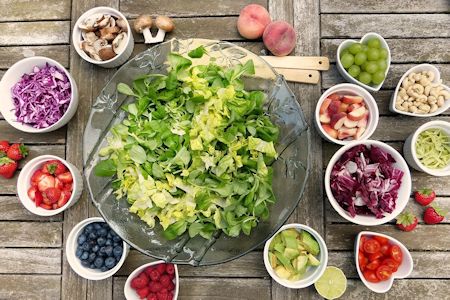
Macronutrients – The basic components of foods are calories (energy) and nutrients. There are six (6) kinds of nutrients – Carbohydrates, Proteins, Fats, Vitamins, Minerals and Water. Of these, Carbohydrates, Proteins and Fats are macronutrients. They are referred to as “energy” nutrients because they contain calories and provide energy to fuel the body. The difference is that each nutrient has individual value of calories per gram. For example, 1 gram of Carbohydrates has 4 calories; 1 gram of Protein has 4 calories; and 1 gram of Fat has 9 calories. No one food carries all the essential nutrients to keep the body functioning properly. (In the next sections, you will learn the foods sources of different kinds of nutrients).

Micronutrients – Vitamins and Minerals are micronutrients and they are only needed in small amounts to help the macronutrients complete their job. Vitamins and minerals do not contain calories, but they are called “essential” nutrients because they are needed to complete the body’s chemical processes. This means that for a certain food such as meat to completely go into your muscles to keep you strong, it must have the micronutrients to go with it in order for that function to complete. In addition, the body can not normally make them, therefore, they must be obtained from a food source.

Contrasting micronutrients in layman’s terms, they work like spark plugs in the automobile that crank up the engine. Nutrients are very helpful with each other, but there are also some that can work against each other. The role of a Registered Dietitian Nutritionist is so important in correcting the nutritional deficiencies of a patient by evaluating and determining his/her nutrient needs. In essence, building a good health necessitates the essential nutrients – the macronutrients and micronutrients.

The amazing fact about the human body is that it is made up of 650 muscles and 206 bones all powered by a heart that beats close to 36 million times a year. The exchange of oxygen and expulsion of carbon dioxide (breathing) works about 23,000 times a day while the mind through the power of eyesight performs about 10 billion computer-like calculations to read a sentence in seconds. All of these are made possible by foods that contain all the essential nutrients to keep it working.
Water is not classified in either 2 types of nutrients (macronutrients or micronutrients) mentioned. However, it is considered the most important nutrient not because of zero calories it gives, but the environment it gives to the living cells. As mentioned in earlier pages that our body is made of trillions of cells and it living environment is Water. The truth of the matter is that – we can survive without eating foods for a week or more, but not without water for 3 days.
Ofelia B. Mutia, MS.,RDN.,LD.
